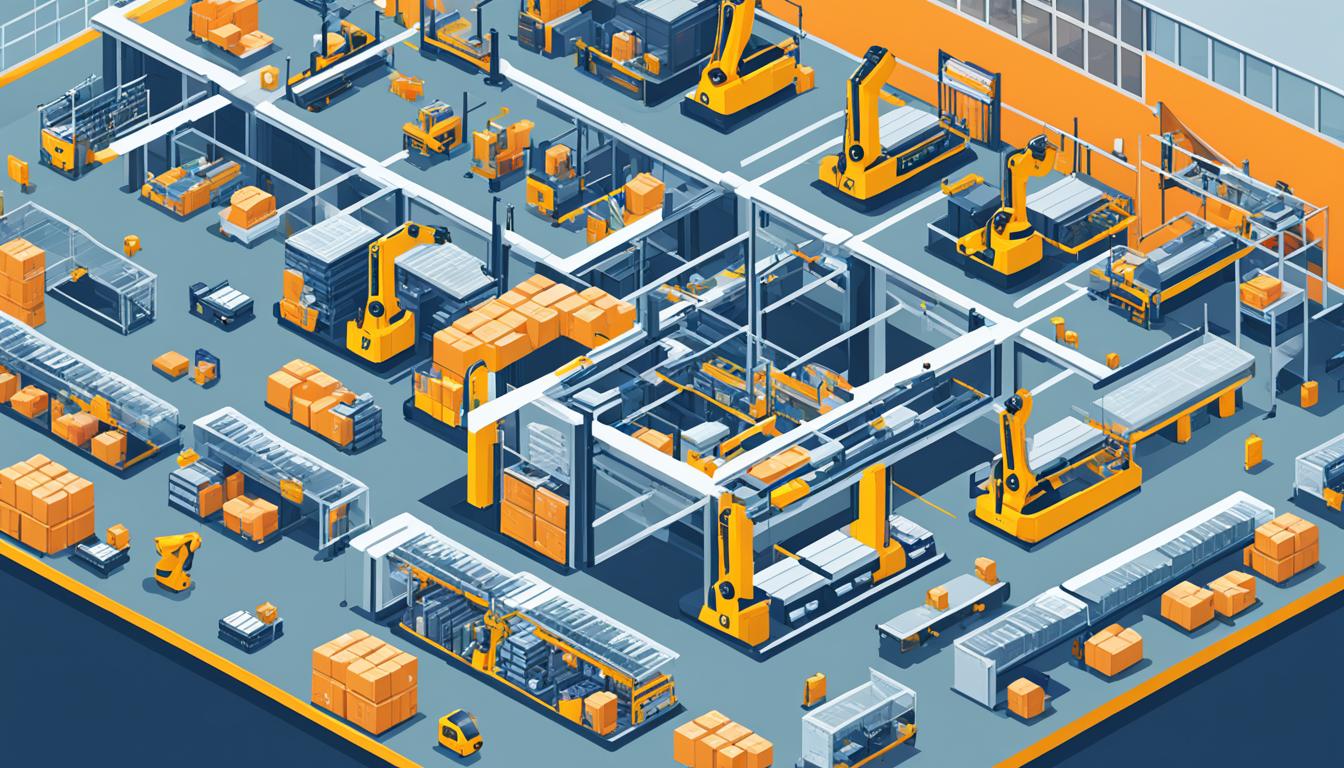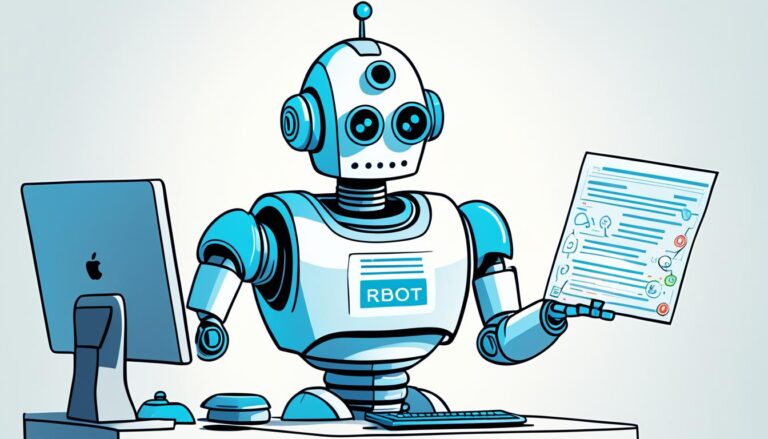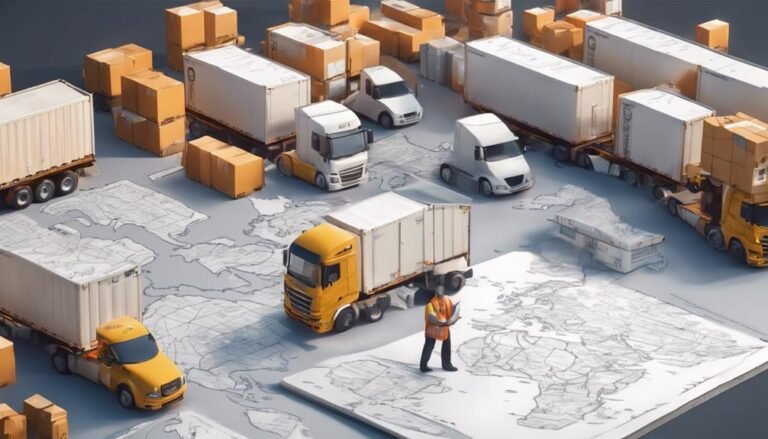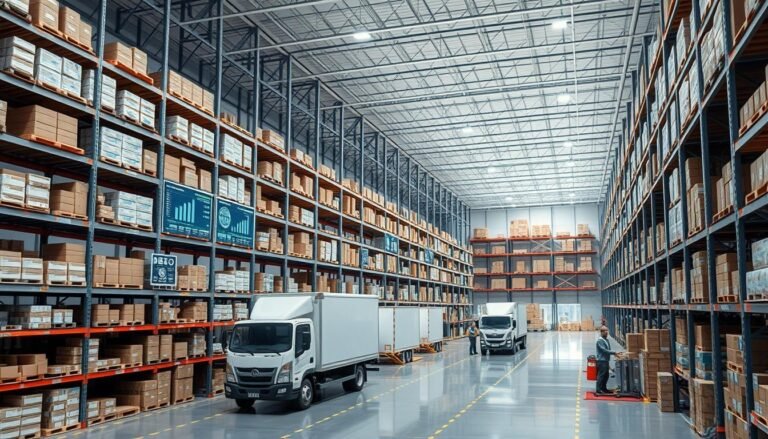The Role of AI in Supply Chain Management and Optimization
Artificial intelligence (AI) is changing how supply chains are managed. It helps companies improve their inventory, forecast demand, and please customers better. By doing this, AI is transforming the world of logistics. But, how does AI benefit supply chains, and how can companies use AI to run more smoothly?
We will look into AI’s part in managing and optimizing supply chains in this piece. We’ll talk about how AI is being used more in logistics. We’ll show you how it helps with inventory and predicting what customers will want. Plus, we’ll look at how it changes operations in supply chains. Also, we will talk about the problems companies might have when they try to use AI in their supply chains. And we’ll touch on what the future holds for AI in these areas.
If you’re interested in how AI is changing the game in logistics, keep reading. We’ll uncover how AI could revolutionize the management and optimization of supply chains.
Key Takeaways:
- AI is revolutionizing how supply chains are managed by making inventory, demand predictions, and customer service better.
- The use of AI in logistics is growing. This is because it helps make supply chain processes more visible, operations are better, and it serves customers more.
- Examples of AI in supply chains include making inventory more efficient and predicting what customers will want.
- AI changes supply chain management significantly. It makes things run smoother, saves money, pleases customers more, speeds up changing plans, and makes systems tougher.
- There are challenges to putting AI in supply chains such as getting enough data, knowing how to do it, cost, and dealing with change.
The Rise of AI in Supply Chain Management
Lately, artificial intelligence (AI) has been making a big splash in supply chain management. By 2025, around 70% of supply chain leaders hope to use AI. This shows that AI is becoming more important in how we handle logistics.
One big plus of AI is its ability to make supply chains more visible. Companies can use AI to see what’s going on with their products, how they’re made, and where they’re going. This helps them find and fix problems early, keeping everything running smoothly and avoiding delays.
AI is also great at managing how much stock a company has. By looking at data and trends, AI can guess what people will want to buy. This means companies can have just the right amount of goods on hand, not too much or too little. Getting this right saves money and makes the whole supply chain work better.
Another great use of AI is spotting when demand for a product might go up or down. AI looks at the past and current trends to figure this out. With this info, companies can plan ahead, buy the right amount of materials, and make sure they get products to customers on time.
AI in supply chain management helps solve problems early, keep just the right amount of stock, and has a good idea of what people will want to buy.
AI isn’t just for behind the scenes. It can also make customers happier. Chatbots, powered by AI, can answer questions and give updates on orders quickly. This means humans in customer service can work on more difficult tasks. Companies can respond to customers faster and in a more personalized way.
The Benefits of AI in Supply Chain Management
Using AI comes with a lot of perks for supply chains. It can help by:
- Improving how we see and manage supply chains
- Making sure we have the right amount of products and spending less on storage
- Making customers happier with better service
- Running operations more smoothly and efficiently
- Being better prepared for unexpected changes
AI is changing the game in supply chain management. As more and more businesses adopt this tech, they’re becoming more efficient and satisfying their customers better. It’s giving them an edge in the world market.
The Role of AI in Supply Chain Optimization
AI is key in making supply chains run better. It uses predictive analytics to watch over stock, guess what people will want, and spot risks in getting things from place to place. This lets companies keep just the right amount of goods, get things to customers faster, and run smoother overall.
Thanks to AI, businesses can react and bounce back faster in their day-to-day. They use AI to pick what to do next using fresh data, making sure goods are in stock when and where they’re needed. This keeps customers happy and saves money by not having too much or too little stock.
The great thing about AI is that it’s awesome at handling huge amounts of information. It finds links between things like how people shop, what’s popular, and things outside a company’s control that might mess up their plans. This helps them get ready before trouble hits and keep things on track.
AI-powered supply chain optimization helps businesses become more efficient, agile, and resilient.
AI also improves how things are shipped and delivered. It looks at data from traffic, weather, and routes to figure out the fastest way to move products. This cuts costs and makes sure things get where they’re going on time.
AI is also great at guessing how much stuff people will need. It looks at past data, what’s trending, and how people are shopping to better predict what’s coming. This helps companies keep the right amount of stuff on hand, plan what to make, and decide what to charge. So, they’re ready for demand and don’t waste money on too much stuff.
Using AI this way helps businesses lead the pack by improving how they work, taking better care of customers, and rolling with changes in the market. It opens doors to run not just better but smarter, ready for whatever the future brings in supply chains.
The Benefits of AI in Supply Chain Optimization
Putting AI in supply chains brings lots of pluses, like:
- Improved efficiency: AI makes tasks smoother, trims waste, and directs resources better.
- Enhanced customer service: AI speeds up and nails down deliveries, making customers happier.
- Reduced costs: AI cuts down on too much stock and unneeded transport, saving money.
- Increased agility: AI helps businesses change fast with the market and what customers want.
- Improved resilience: AI spots and helps sidestep risks in the supply chain, keeping business smooth.
With all these good points, having AI in supply chains is a big plus for companies wanting to do well in a tough market.
Real-World Use Cases of AI in Supply Chain Management
AI is changing supply chain management. It helps companies control inventory better, predict what customers will buy, and operate more smoothly. Amazon and Walmart are prime examples. They use AI to keep customers happy, spend less, and sell more.
AI in Inventory Management
AI shines in managing stock. Amazon, for instance, uses AI to set just the right amount of products to keep in stock. This is based on looking at past sales, what customers tend to buy, and trends in the market. It helps them avoid having too much or too little stock.
AI in stock management keeps tabs on what people are likely to buy. It does this by crunching a lot of data. By doing this, businesses waste less, ensure they have what people want, and keep products on the shelves.
AI in Demand Forecasting
Forecasting sales is another place where AI is key. Walmart, for example, uses AI to predict what people will want to buy. It looks at sales history, market trends, and even weather and events. This helps create pretty spot-on guesses about what people will buy.
“AI-powered demand forecasting enables businesses to optimize inventory levels, production schedules, and pricing, thereby improving overall supply chain efficiency.” – Walmart Supply Chain Executive
Guessing sales correctly is a big deal. It makes sure products are made or stocked on time. It also helps with pricing things right. This way, customers are happier, businesses cut down on unwanted stock, and they lose less money from not having what people want.
Real-World Applications of AI in Supply Chain Management
| Industry | AI Application |
|---|---|
| Retail | Amazon optimizes inventory levels using AI algorithms. |
| Retail | Walmart utilizes AI for demand forecasting to optimize inventory levels. |
| Manufacturing | AI-powered supply chain planning tools optimize production schedules based on demand forecasts. |
| E-commerce | AI algorithms analyze customer behavior to personalize product recommendations and optimize order fulfillment. |
These examples show how AI is a game-changer in supply chain management. By using AI smartly, companies can outperform others by working better, spending smarter, and pleasing their customers more in the fast-paced world of supply chains.
The Impact of AI on Supply Chain Management
AI has changed the game for supply chain management. It brings benefits that make things run smoother, cut costs, and keep customers happy. Thanks to AI, companies can improve their supply chain workings. This makes them faster and more able to handle challenges. Let’s look at how AI has changed the supply chain management scene:
Improved Efficiency
AI makes supply chain jobs easier by doing tasks on its own and providing up-to-the-minute information. This tech uses smart analytics and learning algorithms to make sure company stocks are just right, guess about trends, and make buying better. These steps lead to better operations and saving money.
Reduced Costs
In supply chain work, AI spots where money can be saved in managing supplies, moving goods, and storing them. With AI’s help in guessing what’s needed by looking at data, companies can avoid getting too much or too little of something. This cuts the cost of storing those goods. Plus, AI can plan the best routes for getting things from place to place. This saves on shipping and improves how the chain runs.
Improved Customer Service
AI boosts how well supply chain companies serve their customers. By using AI chat systems and helpers, these companies can answer questions fast and anytime. This makes customers happy and lets human help workers deal with big issues. It all adds up to a better customer service experience.
Increased Agility
Thanks to AI, companies can change gears easily when the market or what customers want shifts. By checking data right away and foreseeing problems, they can fix issues before they get big. This nimbleness helps deal with sudden changes well, like new customer trends or supply chain troubles, with little hit on how smooth things run.
Improved Resilience
AI helps make supply chains stronger by finding spots of risk and dealing with them. It looks at what might happen and how things went in the past to see the possible troubles. Then, it suggests plans to handle them. This careful look at risk makes the chain more able to keep going, even if the unexpected happens.
A recent McKinsey study says using AI in the supply chain can cut costs by 10-20% and lower risks by 20-50%. These big benefits show why more companies are turning to AI to make their supply chain work better.
Table: Financial Benefits of AI in Supply Chain Management
| Financial Benefit | Percentage Improvement |
|---|---|
| Cost Savings | 10-20% |
| Supply Chain Risks Reduction | 20-50% |
The numbers prove the big role AI plays in supply chain management, showing it can really change the way the industry works.
The Challenges of Implementing AI in Supply Chain Management
Using AI in supply chain management comes with many hurdles. To get the most of AI, businesses need to deal with issues like data, expertise, costs, and leading through change.
Data Availability
Getting enough and good data is crucial for AI in supply chain. AI needs tons of data to work well. But, some businesses might not have all the data they need. This makes collecting, cleaning, and combining data a big task.
Technical Expertise
AI also needs a special set of technical skills to be used. To make AI work, companies must understand complex algorithms and data analysis. Some businesses might not have these skills in their team, so they’ll have to partner with others or get new talent.
Cost
Using AI in supply chain can be expensive. It involves the cost of tech tools, software, and hiring AI experts. Small and medium-sized businesses might find this too costly. They have to think hard about spending money on AI and the benefits it will bring.
Change Management
Adjusting existing supply chain processes for AI can be a tough job. It’s not just about the tech, but also about getting people on board. Staff need to learn about AI and how it changes their work. They might worry about losing their jobs, which is something businesses need to address.
“The successful implementation of AI in supply chain management requires overcoming challenges related to data availability, technical expertise, cost, and change management.”
Still, overcoming these hurdles can lead to big gains with AI. It can push businesses to be more innovative, efficient, and ahead of the competition.
The Future of AI in Supply Chain Management
AI is moving supply chains into the future. It makes operations more effective and strong. By using AI in management, the supply chain world is changing for the better.
AI-Powered Robots for Automation
AI is making robots key in supply chain work. These robots can do complex tasks well, from working in warehouses to packing. They cut down on mistakes and make work more efficient.
Virtual Assistants for Customer Service
Virtual assistants with AI are changing how service is done. These smart chatbots talk to customers and help them right away. They’re getting better at understanding what customers need, making everyone happier.
Predictive Analytics for Demand Forecasting
AI will help predict what people will want to buy. It looks at past data, trends, and behavior to make good guesses. This means companies can stock up right and make customers happy.
Self-Driving Vehicles for Transportation
AI in vehicles is changing how things are delivered. Self-driving cars and trucks use AI to travel safely and fast. This can speed up deliveries, save money, and make moving goods smoother.
Blockchain for Improved Transparency
Blockchain is adding more honesty to supply chains. It keeps a secure record of everything moving in the chain. This stops fraud and helps everyone be more trusting in the chain.
The future of AI in managing supply chains looks bright. It will keep making supply chains work better for everyone. AI will help companies keep up and do well in a changing market.
- “The Future of Supply Chain Management: How AI Will Change the Game,” Forbes
- “Technological Advancements in Supply Chain Management,” Supply Chain Digital
- “How AI is Revolutionizing the Logistics and Supply Chain Industry,” Business Insider
FlowspaceAI: Revolutionizing Supply Chain Management
FlowspaceAI for Freight is a tool powered by AI and machine learning. It’s made to cut down on manual tasks and boost supply chain efficiency. This high-tech answer changes how companies handle their supply chains.
Businesses using FlowspaceAI for Freight can better their fulfilment and supply chains. This tool lets them use data for smarter choices, improve how things run, and boost work output.
This tool uses smart algorithms to look at big data and give deep supply chain insights. It helps businesses spot and fix issues fast, get the right amount of stock, and serve customers better.
“FlowspaceAI for Freight has really changed how we manage our supply chain. It’s cut down on boring tasks and made our work better by guessing demand right and keeping our stock at the best levels. The AI has helped us decide better, saving money and making our customers happier.” – Supply Chain Manager, XYZ Company
FlowspaceAI for Freight cuts down on manual tasks and mistakes. It makes work smoother, saving on much-needed resources, finding the best ways to move things around, and lowering transport costs.
Using AI and machine learning through FlowspaceAI pushes supply chain management forward. It helps companies improve how they handle things, serve customers better, and grow in a lasting way.
Benefits of FlowspaceAI for Supply Chain Management
Bringing in FlowspaceAI for Freight into the supply chain brings lots of pluses, including:
- Optimized fulfilment
- Better stock management
- More accurate guess of what’s needed
- Smoother work
- Spending less
- Getting more done
- Happy customers being served better
FlowspaceAI for Freight gives businesses the chance to fully use their supply chains with smart AI and machine learning. By making use of this advanced tool, companies hike up quality, win in the competition, and succeed in today’s fast and always changing market.
FlowspaceAI for Freight mixes AI, machine learning, and supply chain know-how to change and improve how supply chain operations work. Its advanced features help businesses smoothly handle the varied challenges of supply chain management.
The Role of AI in Accurate Inventory Management
Having the right amount of items in stock is key for any business. Doing this well helps companies meet what customers want, run more smoothly, and spend less. AI is changing the game in how companies handle their stock by sifting through big sets of data in a flash. This lets them plan better based on what people will probably buy, making sure they have just enough of each item.
Thanks to AI, companies can avoid losing money on too much or too little stock. With AI’s help, businesses can pick the right steps using what’s really happening out there. This keeps their shelves stocked just right, making everyone happy and the business more money.
One big upside of AI is how well it can guess what people will want to buy. Looking at past sales, what’s trendy, and how we all shop, AI can pretty well guess what’s ahead. This means less chance of too much stock sitting around or running out, which keeps money flowing and costs low.
“AI-driven supply chain planning tools help businesses forecast supply and demand, predict consumer habits, and optimize inventory levels.”
Also, AI tools don’t just help with big planning but with daily updates too. They keep an eye on what customers are doing and what’s popular right now. With this info, they can instantly tweak how much of something a store should have. This keeps everything moving smoothly and stops there being too much stuff that just sits there, saving on waste and sales.
Adding AI also makes it easier to see what’s going on across the whole supply chain. With the right AI, companies can see their items right as they move, step in when things slow down, and cut risks. This fast feedback makes fixing any issues quicker, keeping the whole operation humming along.
AI is really changing how companies do business, letting them plan smarter, stock better, and run more efficiently overall. By using these AI tools, businesses can save money, keep customers happier, and stay ahead in the ever-changing market space.
As AI becomes more and more important for stock control, companies that adopt it early will stand out. They’ll be better prepared for what customers want, find ways to run better, and achieve lasting success.
AI in Optimizing Routing and Delivery
AI is changing how we deliver goods efficiently. It uses real-time data to create the best routes. This means faster deliveries and lower costs. It’s a win for companies and their customers.
AI doesn’t stop at routes. It also makes shipping containers more efficient. By looking at container sizes, AI finds the best way to pack. This cuts down on wasted space and makes shipping more efficient.
Warehouses also benefit from AI. It helps with storage, finding products, and preparing orders. With AI, warehouses can do more accurately and quickly. This boosts how many orders a company can handle in a day.
In the end, AI improves the entire supply chain. Companies can save money and still keep customers happy. Thanks to AI, managing logistics is easier and more effective today.
Key Benefits of AI in Optimizing Routing and Delivery:
- Reduced delivery times
- Minimized transportation costs
- Maximized container utilization
- Improved warehouse efficiency
- Enhanced customer satisfaction
AI and Customer Service in Logistics
AI is changing customer service in logistics through chatbots and automated systems. This lets companies in logistics offer support that’s quicker and more exact to their customers.
AI chatbots help deal with customer questions in supply chain management. They use natural language processing and learn from data to answer questions quickly and accurately.
One big plus with AI chatbots is they’re always available, day or night. This means customers don’t have to wait for help. It makes customers happier and keeps the service level high.
What’s more, AI chatbots can handle many questions at once. This means quicker and more personal answers. It lets human workers focus on solving bigger or more complex issues.
By using AI for customer service, logistics businesses can work more efficiently. They save time by having AI handle the repetitive tasks. This makes their overall service smoother.
AI in customer service also gives businesses lots of useful information. They can spot problems, see what customers like, and then make products and services better based on this data.
“The use of AI chatbots has really sped up how we help customers and how happy they are with our service. Customers love the quick, correct help they get. And our team can give more detailed help when it’s needed.”
– Alex Thompson, Customer Service Manager at XYZ Logistics
AI is making a big impact in customer service in the logistics world. As more logistics companies use AI, customers will get better service. This will help companies grow and keep customers coming back.
Conclusion
AI is changing how we manage supply chains for the better, especially in logistics. It brings benefits such as better efficiency, lower costs, and improving how we serve customers. This tech also helps companies be more flexible and better prepared for challenges.
AI is having a big impact on keeping inventory accurate. With AI tools, companies can predict and manage their stock better. This means they can avoid having too much or too little inventory. As a result, companies run more smoothly and meet customer needs better.
AI is also great for planning out routes and deliveries. It looks at real-time info to pick the best routes and make sure every bit of space is used well. This not only saves money but also makes customers happy with faster, reliable deliveries.
Looking ahead, there’s a lot AI can still do for supply chains. Think about AI robots, smart helpers, and even self-driving vehicles. These, along with using blockchain, will keep making supply chains more effective and ready for anything. With more AI, the future of managing supply chains looks bright.







